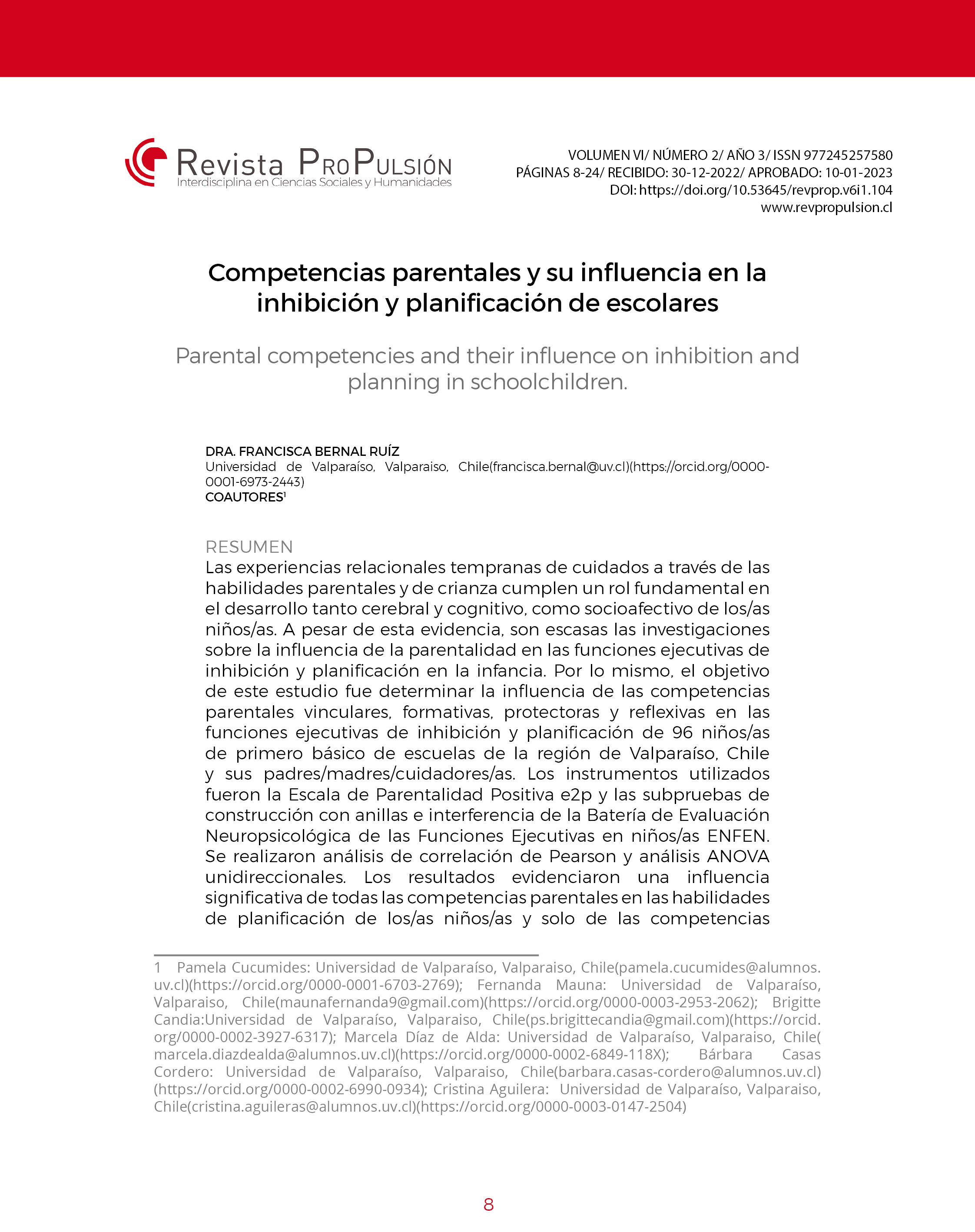Competencias parentales y su influencia en la inhibición y planificación de escolares
DOI:
https://doi.org/10.53645/revprop.v6i1.104Palabras clave:
parentalidad, función ejecutiva, inhibición, planificación, desarrollo cognitivo, infanciaResumen
Las experiencias relacionales tempranas de cuidados a través de las habilidades parentales y de crianza cumplen un rol fundamental en el desarrollo tanto cerebral y cognitivo, como socioafectivo de los/as niños/as. A pesar de esta evidencia, son escasas las investigaciones sobre la influencia de la parentalidad en las funciones ejecutivas de inhibición y planificación en la infancia. Por lo mismo, el objetivo de este estudio fue determinar la influencia de las competencias parentales vinculares, formativas, protectoras y reflexivas en las funciones ejecutivas de inhibición y planificación de 96 niños/as de primero básico de escuelas de la región de Valparaíso, Chile y sus padres/madres/cuidadores/as. Los instrumentos utilizados fueron la Escala de Parentalidad Positiva e2p y las subpruebas de construcción con anillas e interferencia de la Batería de Evaluación Neuropsicológica de las Funciones Ejecutivas en niños/as ENFEN. Se realizaron análisis de correlación de Pearson y análisis ANOVA unidireccionales. Los resultados evidenciaron una influencia significativa de todas las competencias parentales en las habilidades de planificación de los/as niños/as y solo de las competencias parentales protectoras en la inhibición. Resultados que pueden servir como evidencia para el diseño e implementación en las escuelas de programas tanto de parentalidad y crianza positiva como de estimulación de las FE, que promuevan el desarrollo cognitivo y socioafectivo en los/as niños/as.
Descargas
Citas
Arán, V., & Krumm, G. (2020). A hierarchical model of cognitive flexibility in children: Extending the relationship between flexibility, creativity and academic achievement. Child neuropsychology: A journal on normal and abnormal development in childhood and adolescence, 26(6), 770–800. https://doi.org/10.1080/09297049.2019.1711034
Bernal-Ruiz, F., Rodríguez, M., González, J., & Torres, A. (2018). Competencias parentales que favorecen el desarrollo de funciones ejecutivas en escolares. Revista Latinoamericana de Ciencias Sociales, Niñez y Juventud, 16(1), 163–176. http://dx.doi.org/10.11600/1692715x.16109
Best, J.R., Miller, P.H., & Jones, L.L. (2009). Executive functions after age 5: Changes and correlates. Developmental Review, 29(3), 180–200. https://doi.org/10.1016/j.dr.2009.05.002
Bornstein, M., & Putnick, D. (2012). Cognitive and socioemotional caregiving in developing countries. Child Development, 83(1), 46–61. https://doi.org/10.1111/j.1467-8624.2011.01673.x
Bronfenbrenner, U. (1979). The ecology of human development. Harvard University Press.
Constantinidis, C., & Luna, B. (2019). Neural substrates of Inhibitory control maturation in adolescence. Trends in Neurosciences, 42(9), 604–616. https://doi.org/10.1016/j.tins.2019.07.004
Conway, A., Waldfogel, J., & Wang, Y. (2019). Disparities in kindergarteners’ executive functions at kindergarten entry: Relations with parenting and childcare. Early Childhood Research Quarterly, 48, 267–283. https://doi.org/10.1016/j.ecresq.2019.03.009
Cortés, A., Moyano, N., & Quile, A. (2019). The relationship between executive functions and academic performance in primary education: Review and meta-analysis. Frontiers in psychology, 10, 1–18. https://doi.org/10.3389/fpsyg.2019.01582
de Cock, E.S.A., Henrichs, J., Klimstra, T. A., Maas, A.J.B.M., Vreeswijk, C.M.J.M., Meeus, W.H.J., & van Bakel, H.J.A. (2017). Longitudinal associations between parental bonding, parenting stress, and executive functioning in toddlerhood. Journal of Child and Family Studies, 26(6), 1723–1733. https://doi.org/10.1007/s10826-017-0679-7
del Valle, M.V., & Zamora, E.V. (2021). El uso de las medidas de auto-informe: ventajas y limitaciones en la investigación en Psicología. Alternativas en Psicología, 47, 22–35.
Diamond, A. (2020). Executive functions. In A. Gallagher, C. Bulteau, D. Cohen, & J.L. Michaud (Eds.). Handbook of clinical neurology, 173, 225–240. https://doi.org/10.1016/B978-0-444-64150-2.00020-4
Díaz, A., Raquel, M., Jiménez, J. E., García, E., Hernández, S., & Rodríguez, C. (2012). Torre de Hanoi: datos normativos y desarrollo evolutivo de la planificación. European Journal of Education and Psychology, 5(1), 79–91. https://doi.org/10.30552/ejep.v5i1.81
Doan, S.N., & Evans, G.W. (2020). Chaos and instability from birth to age three. Future of Children, 30(2), 93–113. https://files.eric.ed.gov/fulltext/EJ1293542.pdf
Filippi, R., Ceccolini, A., Periche-Tomas, E., & Bright, P. (2020). Developmental trajectories of metacognitive processing and executive function from childhood to older age. Quarterly journal of experimental psychology, 73(11), 1757–1773. https://doi.org/10.1177/1747021820931096
Friedman, S.L., Scholnick, E.K., Bender, R.H., Vandergrift, N., Spieker, S., Pasek, K.H., Keating, D.P., Park, Y., & The NICHD Early Child Care Research Network (2014). Planning in middle childhood: Early predictors and later outcomes. Child Development, 85(4), 1446–1460. http://dx.doi.org/10.1111/cdev.12221
Gauvain, M., & Pérez, S. (2008). Mother-child planning and child compliance. Child Development, 79(3), 761–775. http://dx.doi.org/10.1111/j.1467-8624.2008.01156.x
Gómez, E., & Muñoz, M. (2014). Escala de Parentalidad Positiva e2p. Fundación Ideas para la Infancia.
Halse, M., Steinsbekk, S., Hammar, Å., Belsky, J., & Wichstrøm, L. (2019). Parental predictors of children's executive functioning from ages 6 to 10. British Journal of Developmental Psychology, 37(3), 410–426. https://doi.org/10.1111/bjdp.12282
Hartung, J., Engelhardt, L.E., Thibodeaux, M.L., Harden, K.P., & Tucker-Drob, E.M. (2020). Developmental transformations in the structure of executive functions. Journal of experimental child psychology, 189, 104681. https://doi.org/10.1016/j.jecp.2019.104681
Holochwost, S.J., Volpe, V.V., Iruka, I.U., & Mills-Koonce, W.R. (2020). Maternal warmth, intrusiveness, and executive functions in early childhood: Tracing developmental processes among African American children. Early Child Development and Care, 190(2), 210–218. https://doi.org/10.1080/03004430.2018.1461096
Kloo, D., & Sodian, B. (2017). The developmental stability of inhibition from 2 to 5 years. The British journal of developmental psychology, 35(4), 582–595. https://doi.org/10.1111/bjdp.12197
Koizumi, M., & Takagishi, H. (2014). The relationship between child maltreatment and emotion recognition. PLoS One, 9(1), 1–4. https://doi.org/10.1371/journal.pone.0086093
Lecannelier, F., Ascanio, L., Flores, F., & Hoffman, M. (2011). Apego & psicopatología: Una revisión actualizada sobre los modelos etiológicos parentales del apego desorganizado. Terapia Psicológica, 29(1), 107–116. http://dx.doi.org/10.4067/S0718-48082011000100011
Lombardi, C., Casey, B., Thomson, D., Nguyen, H., & Dearing, E. (2017). Maternal support of young children’s planning and spatial concept learning as predictors of later math (and reading) achievement. Early Childhood Research Quarterly, 41, 114–125. https://doi.org/10.1016/j.ecresq.2017.07.004
Miyake, A., Friedman, N., Emerson, M. J., Witzki, A. H., Howerter, A., & Wager, T. D. (2000). The unity and diversity of executive functions and their contributions to complex “frontal lobe” tasks: A latent variable analysis. Cognitive Psychology, 41(1), 49–100. https://doi.org/10.1006/cogp.1999.0734
Montoya, D.A., Ospina. V., Márquez, I. C., Gaviria, A.M., Andrade, R., & Zapata, N. (2017). Relación entre apego y funciones frontales y ejecutivas en niños de 6 a 10 años de una institución educativa pública. Psicología desde el Caribe, 34 (2), 106–119. https://doi.org/10.14482/psdc.34.2.11079
Mukherjee, S. B., Agrawal, D., Mishra, D., Shastri, D., Dalwai, S. H., Chattopadhyay, N., Unni, J., Bharadva, K., Thadhani, A., Lewin, M., Nagaraj, A., Ramji, S., Mehta, R., Singh, V.V., Wagt, A., D’Aquino, L., Pejaver, R. K., Gandhi, A., Tank, J., Thangavelu, S., Basavajara, G.V., Kumar, R.R., & Gupta, P. (2021). Indian academy of pediatrics position paper on nurturing care for early childhood development. Indian Pediatrics, 58(10), 962–969. https://doi.org/10.1007/s13312-021-2332-1
Muñoz, L. (2017). La autorregulación y su relación con el apego en la niñez. Revista Latinoamericana de Ciencias Sociales, Niñez y Juventud, 15(2), 807–821. https://doi.org/10.11600/1692715x.1520201082016
Murphy, Y.E., Zhang, X., & Gatzke-Kopp, L. (2022). Early executive and school functioning: Protective roles of home environment by income. Journal of Applied Developmental Psychology, 78, 101369. https://doi.org/10.1016/j.appdev.2021.101369
Park, J.L., & Johnston, C. (2020). The relations among stress, executive functions, and harsh parenting in mothers. Journal of Abnormal Child Psychology, 48, 619–632. https://doi.org/10.1007/s10802-020-00622-x
Patwardhan, I., Nelson, T.D., McClelland, M.M., & Mason, W.A. (2021). Childhood cognitive flexibility and externalizing and internalizing behavior problems: Examination of prospective bidirectional associations. Research on Child and Adolescent Psychopathology, 49(4), 413–427. https://doi.org/10.1007/s10802-020-00757-x
Pinta, S., Cabascango, K., Pillajo, A., Pozo, M., & Yépez, E. (2019). Primera Infancia: Estudio relacional de estilos de crianza y desarrollo de competencias emocionales. CienciAmérica, 8(2), 171–188. https://doi.org/10.33210/ca.v8i2.232
Portellano, J.A., Martínez, R. & Zumárraga, L. (2011). ENFEN – Evaluación Neuropsicológica de las Funciones Ejecutivas en Niños. TEA Ediciones.
Reyes, S., Barreyro, J.P., & Injoque, I. (2014). Evaluación de los componentes implicados en la función ejecutiva en niños de 9 años. Cuadernos de Neuropsicología/Panamerican Journal of Neuropsychology, 8(1), 44–59. https://doi.org/10.7714/cnps/8.1.202
Röthlisberger, M., Neuenschwander, R., Cimeli, P., Michel, E., & Roebers, C.M. (2012). Improving executive functions in 5-and 6-year-olds: Evaluation of a small group intervention in prekindergarten and kindergarten children. Infant and Child Development, 21(4), 411–429. https://doi.org/10.1002/icd.752
Samuelson, K.W., Krueger, C.E., & Wilson, C. (2012). Relationships between maternal emotion regulation, parenting, and children’s executive functioning in families exposed to intimate partner violence. Journal of Interpersonal Violence, 27(17), 3532–3550. https://doi.org/10.1177/0886260512445385
Sawilowsky, S. (2009). New effect size rules of thumb. Journal of Modern Applied Statistical Methods, 8(2), 597–599. https://doi.org/10.22237/jmasm/1257035100
Schroeder, V.M., & Kelley, M.L. (2010). Family environment and parent-child relationships as related to executive functioning in children. Early Child Development and Care, 180(10), 1285–1298. https://doi.org/10.1080/03004430902981512
Stelzer, F., Cervigni, M.A., & Martino, P. (2012). Impacto de las prácticas de crianza sobre el desarrollo de las funciones ejecutivas durante la infancia. Una revisión de la literatura. Revista Mexicana de Investigación en Psicología, 4(1), 24–36. https://www.medigraphic.com/pdfs/revmexinvpsi/mip-2012/mip121c.pdf
Suor, J. H., Sturge-Apple, M. L., Davies, P. T., & Jones-Gordils, H. R. (2019). The interplay between parenting and temperament in associations with children's executive function. Journal of family psychology, 33(7), 841–850. https://doi.org/10.1037/fam0000558
Taber, K.S. (2018). The use of Cronbach’s alpha when developing and reporting research instruments in science education. Research in Science Education, 48(6), 1273–1296. https://doi.org/10.1007/s11165-016-9602-2
Thisara, P., Chotibang, J., Fongkaew, W., & Jintrawet, U. (2022). Perceptions and experiences of mothers on parenting to promote executive functions in preschool children. Pacific Rim International Journal of Nursing Research, 26(1), 105–120.
Tirapu, J., Cordero, P., & Bausela, E. (2018). Funciones ejecutivas en población infantil: propuesta de una clarificación conceptual e integradora basada en resultado de análisis factoriales. Cuadernos de Neuropsicología / Panamerican Journal of Neuropsychology, 12(3), 1–31. https://doi.org/10.7714/CNPS/12.3.203
Treat, A.E., Morris, A.S., Williamson, A.C., Hays-Grudo, J., & Laurin, D. (2017). Adverse childhood experiences, parenting, and child executive function. Early Child Development and Care, 189(6), 926–937. https://doi.org/10.1080/03004430.2017.1353978
Vargas, J., & Arán, V. (2014). Importancia de la parentalidad para el desarrollo cognitivo infantil: una revisión teórica. Revista Latinoamericana de Ciencias Sociales, Niñez y Juventud, 12(1), 171–186. http://dx.doi.org/10.11600/1692715x.1219110813
Velarde, M., & Ramírez, M. (2017). Efecto de las prácticas de crianza en el desempeño cognitivo en niños de edad preescolar. Revista Chilena Neuropsicología 12(1), 12–18. http://dx.doi.org/10.18273/revsal.v51n3-2019006
Vygotsky, L.S. (1978). El desarrollo de los procesos psicológicos superiores. Grijalbo.
Warneken, F., Steinwender, J., Hamann, K., & Tomasello, M. (2014). Young children’s planning in a collaborative problem-solving task. Cognitive Development, 31, 48–58. http://dx.doi.org/10.1016/j.cogdev.2014.02.003
Werchan, D.M., Ku, S., Berry, D., & Blair, C. (2022). Sensitive caregiving and reward responsivity: A novel mechanism linking parenting and executive functions development in early childhood. Developmental Science, [e13293]. https://doi.org/10.1111/desc.13293
Zink, N., Lenartowicz, A., & Markett, S. (2021). A new era for executive function research: On the transition from centralized to distributed executive functioning. Neuroscience and biobehavioral reviews, 124, 235–244. https://doi.org/10.1016/j.neubiorev.2021.02.011

Publicado
Cómo citar
Número
Sección
Licencia
Derechos de autor 2023 Francisca Bernal-Ruiz, Pamela Cucumides, Fernanda Mauna, Brigitte Candia, Marcela Díaz de Alda, Bárbara Casas-Cordero, Cristina Aguilera

Esta obra está bajo una licencia internacional Creative Commons Atribución-NoComercial 4.0.
- Esta licencia permite a los reutilizadores distribuir, remezclar, adaptar y construir sobre el material en cualquier medio o formato solo con fines no comerciales, y solo mientras se dé atribución al creador.Incluye los siguientes elementos: POR – Se debe dar crédito al creador NC – Solo se permiten usos no comerciales de la obra.







